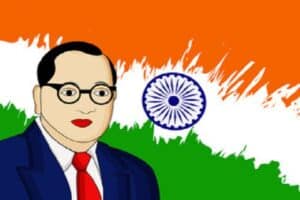Dr. B. R. Ambedkar Biography
Birthday: April 14, 1891 (Aries)
Born In: Madhya Pradesh, India
Also known as: Bhimrao Ramji Ambedkar
Died At Age: 65
Family:
Spouse/Ex-: Ramabai Ambedkar (M. 1906-1935), Savita Ambedkar (M. 1948-1956)
Father: Ramji Maloji Sakpa
Mom: Bhimabai Sakpal
The Children Bhaiyasaheb Ambedkar
Birth in India. Country: India
Quotes By B. R. Ambedkar Lawyers
Died On: December 6, 1956
Place Of Death: Delhi, India
Noteworthy Alumni Gray’s Inn, London School Of Economics
Diabetic Diseases and Disabilities
Co-Founder and Founder: Buddhist Society Of India, Independent Labour Party, Scheduled Castes Federation, Samata Sainik Dal
Dr.Bhimrao Ambedkar Childhood and Early Life
Dr. Bhimrao Ramji Ambedkar was born on April 14, 1891, in Mhow, a small military cantonment town in the Central Provinces (now in Madhya Pradesh), India. He was the 14th child of his parents, Ramji Maloji Sakpal and Bhimabai. His father was a Subedar in the British Indian Army and his mother was a homemaker.
Dr. Ambedkar’s family belonged to the Mahar caste, which was considered as one of the lowest castes in the Hindu social hierarchy. Due to their social status, his family faced discrimination and ostracism from the upper castes. However, his father was a progressive thinker and believed in the importance of education. He ensured that his children received a good education, despite the challenges they faced.
Dr. Ambedkar started his education at the age of five, and he faced many obstacles in his early years due to his caste. He had to sit outside the classroom and wait for the teacher to finish teaching the upper-caste students before he was allowed to enter the classroom. He also faced discrimination from his classmates, who refused to share their water with him, as they considered him to be untouchable.
Despite these challenges, Dr. Ambedkar was a brilliant student and excelled in his studies. He completed his primary education in Satara and then went on to study at the Elphinstone College in Bombay (now Mumbai), where he earned a degree in economics and political science. He then went on to study law at Gray’s Inn in London and later earned a doctorate in economics from Columbia University in New York.
Throughout his life, Dr. Ambedkar fought against caste-based discrimination and worked towards the upliftment of the oppressed and marginalized communities in India. His childhood experiences played a significant role in shaping his worldview and inspiring him to fight for social justice and equality.
The Education of Dr. B. R. Ambedkar
Dr. B.R. Ambedkar was a highly educated individual who pursued his studies with great determination and perseverance. His quest for education began at a very young age, despite the challenges he faced due to his low-caste background.
He started his education at a local government school in Satara, Maharashtra, where he faced discrimination from his classmates and teachers due to his caste. However, his father, who was a retired army officer, was determined to give his children the best possible education, and he encouraged young Ambedkar to study hard.
Dr. Ambedkar’s academic excellence earned him scholarships, which enabled him to attend college. In 1907, he enrolled in Elphinstone College in Bombay (now Mumbai), where he studied economics and political science. He was one of the first members of the low-caste Mahar community to be admitted to the college, and he faced significant discrimination from his upper-caste classmates.
Despite these obstacles, he continued to excel in his studies and went on to complete his bachelor’s degree in 1912. After that, he pursued a master’s degree in economics from Columbia University in New York, where he was awarded a scholarship by the Maharaja of Baroda. He also pursued a degree in law from the University of London.
In 1923, he became the first Indian to be awarded a doctorate in economics from Columbia University for his thesis on the Indian Rupee. He then returned to India and started practicing law in Bombay. In addition to his legal practice, he continued to pursue his scholarly interests, publishing several books on Indian history, economics, and social issues.
Dr. Ambedkar’s commitment to education and his belief in its transformative power led him to work tirelessly to ensure that all members of Indian society had access to quality education. He believed that education was the key to social upliftment and that it could help break the shackles of caste-based discrimination. He established several educational institutions for the marginalized sections of society, including the Siddharth College of Arts and Science in Bombay, which catered primarily to low-caste students.
Dr. Ambedkar’s life and work stand as a testament to the transformative power of education and its ability to bring about social change. His relentless pursuit of education and his efforts to promote education for all have left an indelible mark on Indian society.

Dr.Bhimrao Ambedkar Early Life and Education
Dr. Bhimrao Ramji Ambedkar, also known as Babasaheb Ambedkar, was born on April 14, 1891, in Mhow, a small town in present-day Madhya Pradesh, India. He was born into a low-caste family, and his parents were Ramji Maloji Sakpal and Bhimabai.
During his early childhood, Dr. Ambedkar faced discrimination and social exclusion due to his caste. Despite this, his father, who was a Subedar in the British Indian Army, encouraged him to pursue education. He enrolled him in a local school in Satara, Maharashtra, where he faced discrimination from his upper-caste classmates and teachers.
However, Dr. Ambedkar’s academic brilliance earned him scholarships, which enabled him to attend college. He received his Bachelor of Arts degree in Economics and Political Science from Elphinstone College in Bombay (now Mumbai) in 1912. He then went on to study law and received his degree in 1915 from the University of Bombay.
After completing his education, Dr. Ambedkar worked as a lawyer and started practicing law in Bombay. During this time, he became actively involved in the Indian independence movement and worked to end caste-based discrimination and social inequality.
In 1920, he was appointed as a member of the Bombay Legislative Council, and he worked tirelessly to improve the condition of the marginalized sections of society. He became a prominent leader of the Dalit community and fought for their rights and social justice.
In 1927, he founded the Bahishkrit Hitakarini Sabha, an organization dedicated to the welfare of the downtrodden and outcastes. He also established the People’s Education Society to promote education for all sections of society.
Dr. Ambedkar’s lifelong struggle for social justice and equality made a significant impact on Indian society. He was the principal architect of the Indian Constitution and is widely regarded as the father of the Indian Constitution. He worked tirelessly to ensure that the Constitution guaranteed equal rights and opportunities for all citizens, regardless of their caste, religion, or gender.
Dr. Ambedkar’s early life and education played a significant role in shaping his worldview and inspiring him to fight for the rights of the oppressed and marginalized sections of society. His legacy continues to inspire millions of people in India and around the world.

Dr.Bhimrao Ambedkar Involvement during Independence
Dr. Bhimrao Ambedkar played a significant role during India’s independence movement. He was a prominent social reformer, jurist, and politician who fought tirelessly for the rights of the Dalits and other marginalized communities.
Ambedkar was a member of the Indian National Congress and served as the Chairman of the Constitution Drafting Committee. He was instrumental in the drafting and enactment of the Indian Constitution, which is considered one of the most progressive and democratic constitutions in the world.
Ambedkar also played a crucial role in the Poona Pact of 1932, which helped secure reserved seats for the Dalits in the provincial legislatures and the central assembly. He was also a strong advocate for the rights of women and minorities, and his efforts paved the way for significant reforms in these areas.
Ambedkar’s contribution to India’s independence struggle was not limited to his role in the drafting of the constitution. He was also a vocal critic of British rule in India and fought for India’s freedom through his speeches and writings.
Overall, Dr. Bhimrao Ambedkar’s contribution to India’s independence movement and the subsequent nation-building process was immense, and his ideas continue to inspire millions of people across the country.
The achievements of Dr. B. R. Ambedkar
Dr. B. R. Ambedkar, also known as Babasaheb Ambedkar, was a prominent Indian jurist, social reformer, and politician who worked tirelessly to uplift the socially and economically marginalized sections of the Indian society, particularly the Dalits, who were historically oppressed and discriminated against.
Here are some of his major achievements:
Architect of the Indian Constitution: Dr. Ambedkar was the principal architect of the Indian Constitution, which is the supreme law of India. He played a crucial role in drafting the Constitution and ensuring that it enshrined the principles of liberty, equality, and fraternity.
Champion of social justice: Dr. Ambedkar fought for the rights of Dalits and other marginalized communities throughout his life. He led various social and political movements to end caste-based discrimination and promote social justice in India.
Educationist: Dr. Ambedkar believed that education was the key to empowerment and worked towards promoting education for all. He established many educational institutions, including the People’s Education Society, which aimed to provide education to Dalits and other marginalized communities.
Women’s rights: Dr. Ambedkar was a strong advocate of women’s rights and worked towards ensuring gender equality. He played a crucial role in the inclusion of women’s rights in the Indian Constitution.
Economics: Dr. Ambedkar was also an eminent economist and contributed significantly to the field of economics. He believed in the principles of socialism and advocated for the redistribution of wealth to address poverty and inequality.
Political leadership: Dr. Ambedkar was a prominent political leader and served as India’s first Minister of Law and Justice in the Cabinet of Jawaharlal Nehru. He was also a member of the Constituent Assembly of India and played a key role in the country’s political and constitutional development.
Overall, Dr. Ambedkar’s contributions have been instrumental in shaping India’s modern political, social, and economic landscape, and his legacy continues to inspire generations of Indians to fight for social justice and equality.
Dr.Bhimrao Ambedkar The first Indian to earn a doctoral degree abroad.
Yes, that is correct. Dr. Bhimrao Ambedkar was the first Indian to earn a doctoral degree abroad. He received his PhD in economics from Columbia University in New York City, United States, in 1927. The title of his doctoral thesis was “The Evolution of Provincial Finance in British India”, which was a critical analysis of the British colonial administration’s economic policies in India. This achievement was significant as it broke the barriers of caste and social discrimination prevalent in Indian society during that time, and also set an example for other Indians to pursue higher education abroad.